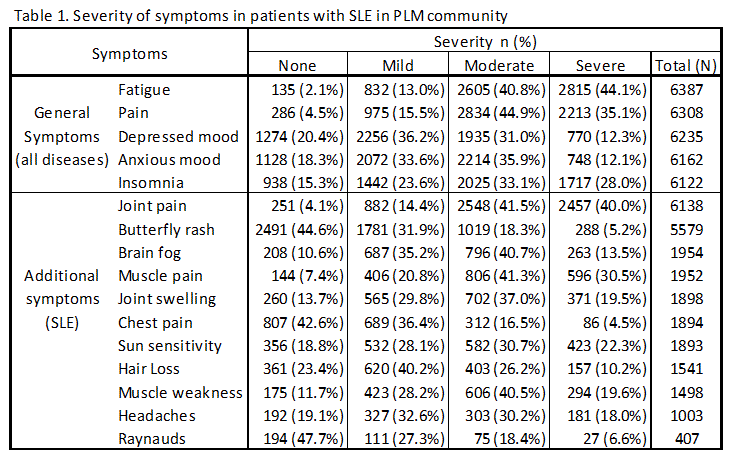Session Information
Date: Monday, October 22, 2018
Title: Patient Outcomes, Preferences, and Attitudes Poster I: Patient-Reported Outcomes
Session Type: ACR Poster Session B
Session Time: 9:00AM-11:00AM
Background/Purpose: Online health communities and research networks such as PatientsLikeMe (PLM) provide important insight into understanding chronic diseases, including systemic lupus erythematous (SLE). We aimed to characterize PLM SLE population by their initial reported patient characteristics.
Methods: Retrospective observational study in PLM online health network. Patients were included in the study if they had registered with PLM between 2011-2017, were aged over 18 years at the time of registration, and reported both SLE and treatment with one or more SLE medications (anti-malarials, immunosuppressive, corticosteroids, calcineurin inhibitors and biologics). Information reported within 30 days of registration was used to assess eligibility and in descriptive analysis to characterize the demographic and clinical characteristics, co-morbidities, treatment of patients and the severity of symptoms they reported, both general (included in symptom panel for all PLM patients) and additional SLE symptoms.
Results: 21,101 patients met the inclusion criteria and were identified as patients with SLE. The median age at registration was 46 years (IQR 38-53), the majority were female (96.8%, N=21 050), and 94.8% (18,491) of the 19,502 patients who reported country were US residents. The 17,994 patients who recorded race were predominately Caucasian (67.8%) and African-American (22.4%). In the 6 489 patients who reported when they had first experienced SLE symptoms the median age of onset was 30 years (IQR 21-39) and age at first diagnosis was 36 years (IQR 27-44) (N=6 936). The most commonly reported comorbidities were fibromyalgia 7.9%, discoid lupus 6.8%, lupus nephritis 6.3%, rheumatoid arthritis 4.8%, subacute cutaneous lupus 4.7%, Sjogren’s Syndrome 3.9%, CNS lupus 3.9%, and lupus pneumonitis 3.1%. At registration patients reported having tried an average of 2.2 SLE medications, most commonly; anti-malarials 83.8%, corticosteroids 78.8%, immunosuppressive 32.3%, and biologic treatment 9.4%. Around 31% of patients (N=6,448) entered any symptom report at registration, and >80% of the patients who reported them rated the severity of fatigue, pain, and joint pain as moderate or severe (Table 1).
Conclusion: The age, gender and race of SLE patients in the PatientsLikeMe community are broadly consistent with what is known about the US SLE population. The PLM SLE population provides a unique source of real world information on the patient experience of symptoms of SLE outside the clinical environment that can be utilized to improve understanding of SLE.
To cite this abstract in AMA style:
Nyman E, Hammond ER, Vaughan T, Desta B, Wang X, Barut V, Emmas C. Characteristics and Symptom Severity in 21,101 Patients Reporting Systemic Lupus Erythematous in the Patientslikeme Online Health Community [abstract]. Arthritis Rheumatol. 2018; 70 (suppl 9). https://acrabstracts.org/abstract/characteristics-and-symptom-severity-in-21101-patients-reporting-systemic-lupus-erythematous-in-the-patientslikeme-online-health-community/. Accessed .« Back to 2018 ACR/ARHP Annual Meeting
ACR Meeting Abstracts - https://acrabstracts.org/abstract/characteristics-and-symptom-severity-in-21101-patients-reporting-systemic-lupus-erythematous-in-the-patientslikeme-online-health-community/

